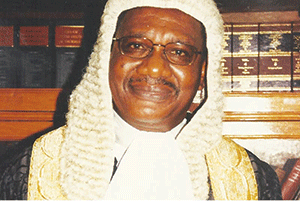Professor of Law, Itsejuwa Sagay (SAN), in this encounter with Senior Correspondent, ONYEWUCHI OJINNAKA, bares his mind on the role of his fellow Senior Advocates of Nigeria (SANs) and judicial officers in the delay of administration of criminal justice.
The problem of awaiting trial is one our judicial system finds as a hard nut to crack. Now, Professor Itse Sagay is heaping the blame on his learned silk colleagues, saying they contribute to the elongation of criminal trials.
Sagay is mostly concerned about the way some senior advocates frustrate criminal trials for the sake of money.
In an interaction with TheNiche, the constitutional and human rights lawyer decried the role of SANs in prolonging prosecution of indicted public officers. He recounts that a lot of public officers were arrested and put on trial for stealing huge sums running into billions of naira, pointing out that some of the former governors, ministers, House of Representatives members, senators and senior civil servants who were accused of stealing billions of naira and charged to a court, have been enjoying the services of SANs who, instead of simply defending, have created major obstruction to the process of prosecution.
He said: “A senior advocate (counsel) could be defending an accused person when he is accused, charged and if the prosecution makes a case, the defence counsel would then bring a defence to counter that case.”
Defending a case, he said, is quite different from frustrating a trial which is what most senior advocates are doing.
“What they do is to file a preliminary objection to the jurisdiction of the court and pursue the preliminary objection relentlessly, endlessly without any restraint and abandon the substantive issue involving the commission of a major crime against the people of this country,” he averred.
Sagay added that after judgment had been given in a case, the SAN(s) in defence would rush to the Court of Appeal on the basis of the jurisdiction, leaving the main case behind. “It is more worrisome to note that when they fail again at the Court of Appeal, they will go to the Supreme Court and at the end of the day, it becomes sad to see the whole process of limiting the matter to a consideration of preliminary objection taking 12 to 15 years.
“By the time the matter comes back after 12 or 15 years, some of the critical officials who would have provided evidence for the prosecution would have retired, some would have died and generally, there would be prosecution fatigue.”
Case for adoption of British system
The professor of law advocated the adoption of British judicial system, which does not tolerate delay in trials. He buttressed his position thus: “If a lawyer deliberately delays trial in England and at the end of the day his client is find guilty, he will get five times the sentence he or she would have been given. Instead of five, he would be given 25 for the delay, while the counsel for the defence will be disbarred from practice for delaying the trial and incurring expenses for the state which carried the burden of trial. We need to look into those aspects of practice and discipline of legal counsel and introduce them in this country.”
Menace of judicial officers
Sagay also indicted the nation’s judicial officers, contending that they contribute to elongation and frustration of criminal prosecution. According to him, the problem is compounded by the attitude of leading judicial officers. “This problem is not just a problem of senior advocates alone; it is also a problem of the Chief Justice of Nigeria, the President of the Court of Appeal, the Chief Judge of Federal High Court and Chief Judges of the State High Courts.”
He maintained that power lies in the hands of these officials to curtail the problem by simply invoking the rules which states that: If any person accused of corruption or stealing or any financial crime raises a preliminary objection about the jurisdiction of the court before which he is charged, the court is compelled by those rules they introduced to take both the preliminary objection and the substantive issue together.
For instance, “if you raise a preliminary objection and I said okay I will listen, and you state your objection and I listened to the other side; I will take my notes as the judge and say, fine, now go to the main case of stealing N20 billion from subsidy allocation, the judge will then hear the whole case, taking his notes and give a date for judgment.”
He submitted that when the judge comes back, he would look at the preliminary objection, and if he feels that he has jurisdiction, he will dismiss it on the spot and say: “I have jurisdiction, I dismiss it” and he will then go ahead and give judgment on the main case of corruption or stealing or financial crime.
He explained: “When the judge does that, the appeal goes to the Court of Appeal as a whole; so there would be no question of going to the Supreme Court and coming back. When it gets to the Court of Appeal, the defence lawyer can come up with an appeal against the issue of jurisdiction and say the court below does not have jurisdiction and then also appeal against any conviction which his client would suffer. The Court of Appeal will take the two together and then he goes to the Supreme Court. The Supreme Court will take the two together and that will be the end of the matter.”
He wondered that for some curious reasons, none of the major public judicial officers has agreed to adopt the method.
“I have personally written to the Chief Justice of Nigeria over three months ago; he has not replied me, (he’s) dead silence on such a critical issue. I do not know what is going on. You cannot go in the public and be complaining about senior advocates dragging on cases while he himself is refusing to take responsibility to curtail it when he has the power to do so,” he said.
Immunity for legislators
Speaking on the issue of immunity, Sagay faulted the move by the legislators in the seventh National Assembly for trying to create immunity for themselves. He posits that the alteration of the constitution was meant to be implemented for the wrong reasons, for the promotion of purely selfish interests as they want to commit crimes while they are in office and escape prosecution.
AGF and Minister of Justice
On the clamour to seperate the office of Attorney General of the Federation (AGF) from the Minister of Justice, the erudite professor said the National Judicial council (NJC) can appoint AGF, expressing that the only good thing he saw in the amendment is the creation of the post of AGF.
He opined that there should be a separation between the AGF and justice minister because there is a clash between the two.
“What is happening now is that the present man who calls himself AGF/Minister of Justice, who is an appointee of the federal government, always favors federal government in allocation of resources and so we need to counter-balance that position.”














